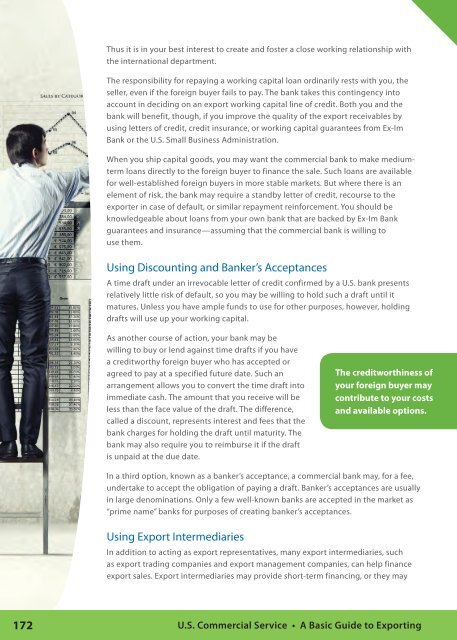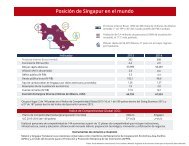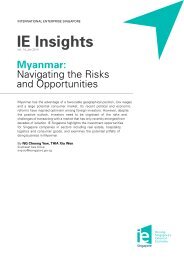basic-guide-to-exporting_Latest_eg_main_086196
basic-guide-to-exporting_Latest_eg_main_086196
basic-guide-to-exporting_Latest_eg_main_086196
Create successful ePaper yourself
Turn your PDF publications into a flip-book with our unique Google optimized e-Paper software.
Thus it is in your best interest <strong>to</strong> create and foster a close working relationship withthe international department.The responsibility for repaying a working capital loan ordinarily rests with you, theseller, even if the foreign buyer fails <strong>to</strong> pay. The bank takes this contingency in<strong>to</strong>account in deciding on an export working capital line of credit. Both you and thebank will benefit, though, if you improve the quality of the export receivables byusing letters of credit, credit insurance, or working capital guarantees from Ex-ImBank or the U.S. Small Business Administration.When you ship capital goods, you may want the commercial bank <strong>to</strong> make mediumtermloans directly <strong>to</strong> the foreign buyer <strong>to</strong> finance the sale. Such loans are availablefor well-established foreign buyers in more stable markets. But where there is anelement of risk, the bank may require a standby letter of credit, recourse <strong>to</strong> theexporter in case of default, or similar repayment reinforcement. You should beknowledgeable about loans from your own bank that are backed by Ex-Im Bankguarantees and insurance—assuming that the commercial bank is willing <strong>to</strong>use them.Using Discounting and Banker’s AcceptancesA time draft under an irrevocable letter of credit confirmed by a U.S. bank presentsrelatively little risk of default, so you may be willing <strong>to</strong> hold such a draft until itmatures. Unless you have ample funds <strong>to</strong> use for other purposes, however, holdingdrafts will use up your working capital.As another course of action, your bank may bewilling <strong>to</strong> buy or lend against time drafts if you havea creditworthy foreign buyer who has accepted oragreed <strong>to</strong> pay at a specified future date. Such anarrangement allows you <strong>to</strong> convert the time draft in<strong>to</strong>immediate cash. The amount that you receive will beless than the face value of the draft. The difference,called a discount, represents interest and fees that thebank charges for holding the draft until maturity. Thebank may also require you <strong>to</strong> reimburse it if the draftis unpaid at the due date.The creditworthiness ofyour foreign buyer maycontribute <strong>to</strong> your costsand available options.In a third option, known as a banker’s acceptance, a commercial bank may, for a fee,undertake <strong>to</strong> accept the obligation of paying a draft. Banker’s acceptances are usuallyin large denominations. Only a few well-known banks are accepted in the market as“prime name” banks for purposes of creating banker’s acceptances.Using Export IntermediariesIn addition <strong>to</strong> acting as export representatives, many export intermediaries, suchas export trading companies and export management companies, can help financeexport sales. Export intermediaries may provide short-term financing, or they may172U.S. Commercial Service • A Basic Guide <strong>to</strong> Exporting





